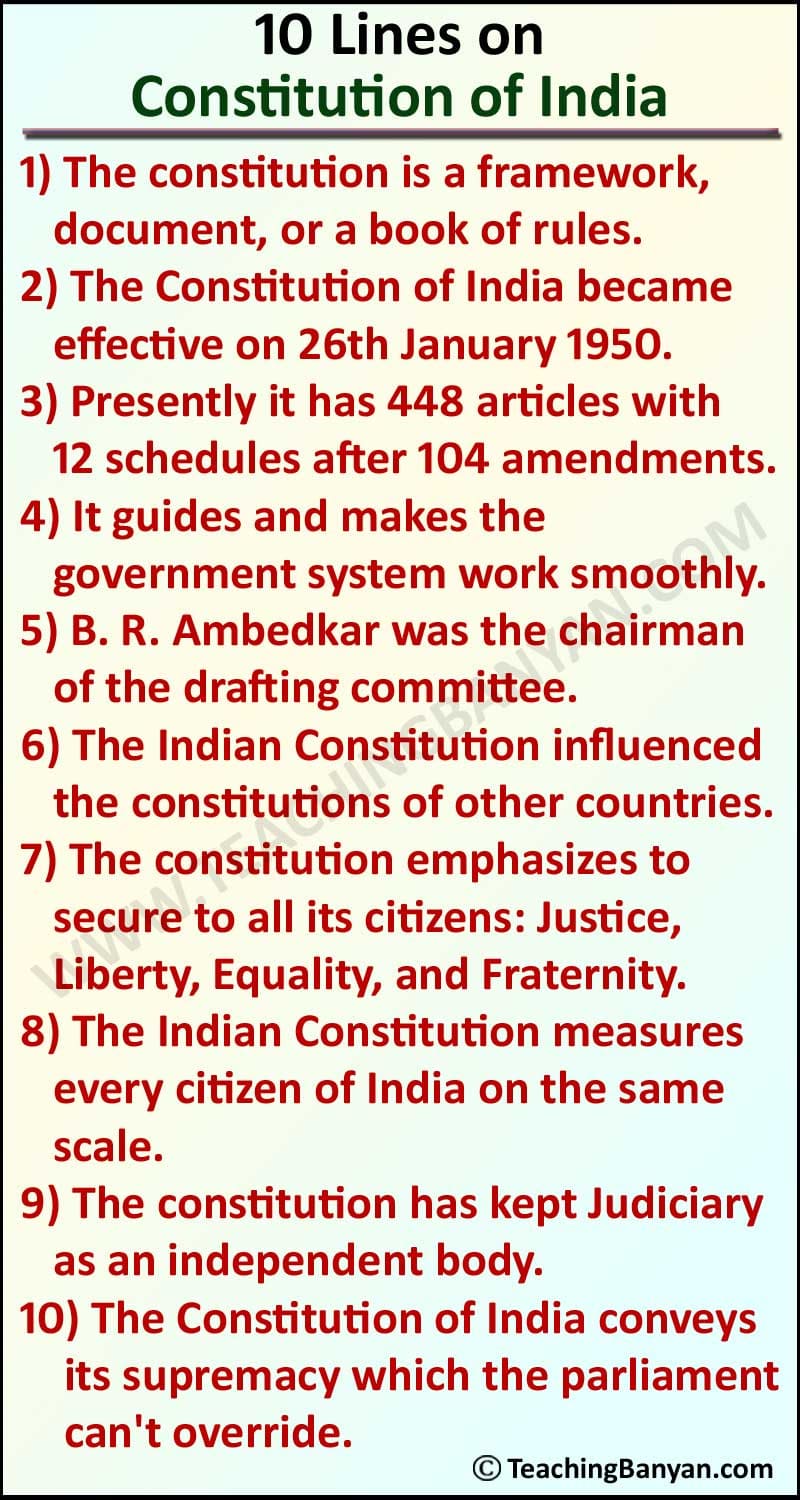Every country has some sets of rule for its citizen to follow to maintain peace and justice. These rules define that country, and together they form the constitution of that nation. India also has its sets of rule and ethics, and their compilation in a book is the ‘Constitution of India’. Let’s read some properties of our constitution through the sets of 10 lines below.
Ten Lines on Constitution of India in English
Children and students of Classes 1, 2, 3, 4, 5 and 6 can find here 10 lines, 5 lines, 20 lines, few lines and sentences on Constitution of India in very easy and simple language to get some help in their studies.
10 Lines on Constitution of India
1) The Indian Constitution holds supreme judicial importance in India.
2) The Constituent Assembly adopted it on November 26, 1949.
3) It is the longest written constitution of the world.
4) Constitution of India is a living document, as it can go through amendments.
5) It declares India as a Sovereign, Socialist and secular Republic.
6) Our constitution professes equality of opportunity and fraternity among the citizens.
7) Many features of the Indian Constitution have taken from the other constitutions of the world.
8) The original constitution had 395 Articles, 22 parts and 8 schedules in it.
9) The Constitution of India has kept judiciary independent of the legislative and executive.
10) The government has preserved the original constitution in Helium filed cases in Parliament House.
10 Lines and Sentences on Constitution of India
1) The constitution is a framework, document, or a book of rules.
2) The Constitution of India became effective on 26th January 1950.
3) Presently it has 448 articles with 12 schedules after 104 amendments.
4) It guides and makes the government system work smoothly.
5) B. R. Ambedkar was the chairman of the drafting committee.
6) The Indian Constitution influenced the constitutions of other countries.
7) The constitution emphasizes to secure to all its citizens: Justice, Liberty, Equality, and Fraternity.
8) The Indian Constitution measures every citizen of India on the same scale.
9) The constitution has kept Judiciary as an independent body.
10) The Constitution of India conveys its supremacy which the parliament can’t override.

5 Lines on Constitution of India
1) Our constitution is drafted by Dr. Bhimrao Ramji Ambedkar.
2) Constitution of India gives several important rights to the citizens.
3) Our constitution is the longest hand written constitution in the world.
4) Constitution of India was completed in 2 years, 11 months and 18 days.
5) Our huge constitution is written single handedly by Prem Behari Narain Raizada.
20 Lines on Constitution of India
1) Dr. B. R. Ambedkar was the chief architect of the Indian Constitution.
2) The constitution decides the powers and duties of the government institutions.
3) The Constitution of India imparts constitutional supremacy.
4) Our constitution has provided some fundamental rights to every citizen of the nation.
5) The fundamental rights are indifferent to caste, religion, culture, language or any other difference.
6) Constitution assures justice, equality and liberty to every citizen of India.
7) Our constitution is essential for India to remain a democratic and secular nation.
8) The 389 members of the Constituent Assembly had drafted it.
9) Dr. B. R. Ambedkar had studied the Constitution of 60 countries before drafting the Indian Constitution.
10) The Indian Constitution took around two years, eleven months and eighteen days to be ready.
11) Constitution of India is the second-longest active constitution after the Constitution of Alabama.
12) Our Constitution has experienced several amendments since its inception.
13) Constitution provides power to the executive, judicial and legislative branches.
14) The Constitution of India is federal in nature and unitary in spirit.
15) The judiciary acts as a watchdog for preserving the Constitution of India.
16) Fundamental Rights and Directive Principles of state policy are chief constituents of the Constitution.
17) The Republic Day of India is the festival of celebration of the enactment of Indian Constitution.
18) With the Constitution coming into effect, India ceased to be a dominion under the British Crown.
19) The first meeting of the constituent assembly had held on 9th December 1946 in the Parliament House.
20) The Constitution of India provides the framework of political principles, procedures and powers.
The Constitution of India is the supreme law to which all the people and government offices must abide. The principles and rules as laid down in the constitution must be acceptable to all. It is a set of guiding principle and rules to govern the Country.
